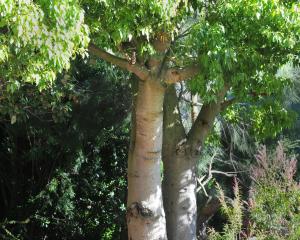The bright flowers give that instant tropical feel to any garden or glasshouse.
There are five different species of Strelitzia, all native to South Africa. Three are flowering in the central house of the winter garden glasshouse at the Dunedin Botanic Garden.
The tallest species, Strelitzia nicolai, is often mistaken for a banana plant, a close relative, as the foliage looks similar.
Once it starts to flower, it is easily recognised with its distinctive white sepals and blue petals. Eventually reaching a height of 10m, it forms a dense clump 3m wide.
This plant needs space to thrive.
The most common species, Strelitzia reginae, is grown in most tropical regions around the world as an ornamental plant.
It was introduced to England by Sir Joseph Banks, a man responsible for introducing many of New Zealand's plants to the world.
Reaching a maximum height of 2m, it is a lot easier to house. The foliage looks similar to S. nicolai, only on a smaller scale. It has orange sepals and blue petals.
Strelitzia juncea has interesting foliage, long reed-like upright cylindrical leaves up to 2m without a leaf blade and with a small ''spoon'' at the tip.
The flowers look similar to Strelitzia reginae. This species is the most drought- and frost-tolerant.
Stephen Bishop is curator of the winter garden glasshouse at the Dunedin Botanic Garden.











